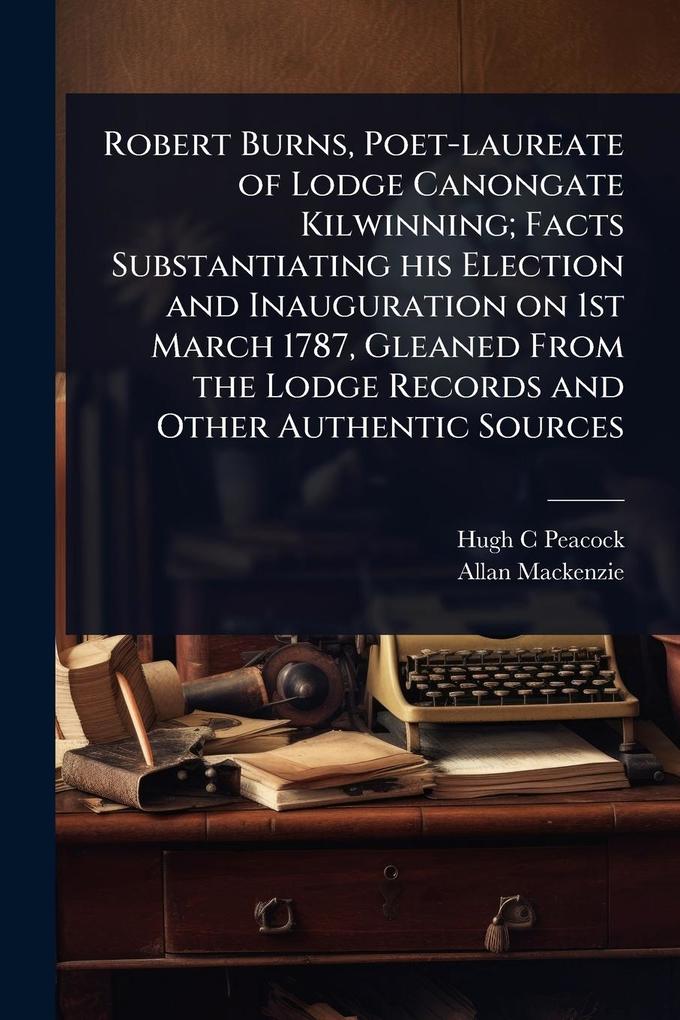
Zustellung: Di, 15.07. - Sa, 19.07.
Versand in 2 Wochen
VersandkostenfreiBestellen & in Filiale abholen:
Explore the fascinating details surrounding Robert Burns's appointment as Poet Laureate of Lodge Canongate Kilwinning with "Robert Burns, Poet-laureate of Lodge Canongate Kilwinning; Facts Substantiating his Election and Inauguration on 1st March 1787, Gleaned From the Lodge Records and Other Authentic Sources." This meticulously researched account, compiled by Hugh C Peacock and Allan Mackenzie, delves into the lodge records and other reliable sources to uncover the facts of Burns's election and inauguration on March 1, 1787.
Offering insights into Burns's life beyond his poetic achievements, this volume sheds light on his involvement with Freemasonry and his connection to one of Scotland's oldest and most respected lodges. Discover the circumstances of his election and inauguration, providing a deeper understanding of Burns's cultural and social milieu.
Perfect for Burns enthusiasts, historians, and anyone interested in Scottish history and Freemasonry, this book provides a unique perspective on the life and times of Scotland's national bard.
This work has been selected by scholars as being culturally important, and is part of the knowledge base of civilization as we know it. This work was reproduced from the original artifact, and remains as true to the original work as possible. Therefore, you will see the original copyright references, library stamps (as most of these works have been housed in our most important libraries around the world), and other notations in the work.
This work is in the public domain in the United States of America, and possibly other nations. Within the United States, you may freely copy and distribute this work, as no entity (individual or corporate) has a copyright on the body of the work.
As a reproduction of a historical artifact, this work may contain missing or blurred pages, poor pictures, errant marks, etc. Scholars believe, and we concur, that this work is important enough to be preserved, reproduced, and made generally available to the public. We appreciate your support of the preservation process, and thank you for being an important part of keeping this knowledge alive and relevant.
Offering insights into Burns's life beyond his poetic achievements, this volume sheds light on his involvement with Freemasonry and his connection to one of Scotland's oldest and most respected lodges. Discover the circumstances of his election and inauguration, providing a deeper understanding of Burns's cultural and social milieu.
Perfect for Burns enthusiasts, historians, and anyone interested in Scottish history and Freemasonry, this book provides a unique perspective on the life and times of Scotland's national bard.
This work has been selected by scholars as being culturally important, and is part of the knowledge base of civilization as we know it. This work was reproduced from the original artifact, and remains as true to the original work as possible. Therefore, you will see the original copyright references, library stamps (as most of these works have been housed in our most important libraries around the world), and other notations in the work.
This work is in the public domain in the United States of America, and possibly other nations. Within the United States, you may freely copy and distribute this work, as no entity (individual or corporate) has a copyright on the body of the work.
As a reproduction of a historical artifact, this work may contain missing or blurred pages, poor pictures, errant marks, etc. Scholars believe, and we concur, that this work is important enough to be preserved, reproduced, and made generally available to the public. We appreciate your support of the preservation process, and thank you for being an important part of keeping this knowledge alive and relevant.
Produktdetails
Erscheinungsdatum
22. Mai 2025
Sprache
englisch
Seitenanzahl
200
Autor/Autorin
Hugh C Peacock, Allan Mackenzie
Verlag/Hersteller
Produktart
kartoniert
Gewicht
286 g
Größe (L/B/H)
234/156/11 mm
ISBN
9781024073140
Bewertungen
0 Bewertungen
Es wurden noch keine Bewertungen abgegeben. Schreiben Sie die erste Bewertung zu "Robert Burns, Poet-laureate of Lodge Canongate Kilwinning; Facts Substantiating his Election and Inauguration on 1st March 1787, Gleaned From the Lodge Records and Other Authentic Sources" und helfen Sie damit anderen bei der Kaufentscheidung.









